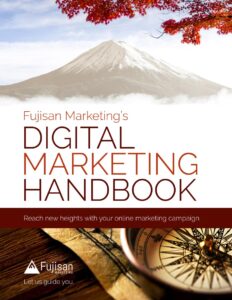In 2006, the word “Google” was added to the Oxford English Dictionary. Its induction is a representation of how Google has grown from a fleeting pop culture reference to a permanent part of our world history. With Google planted firmly as the biggest, baddest search engine monster in the industry, do alternative search engines like Bing even stand a chance to compete against it or share its spotlight? And what does that mean for digital advertising?
At Fujisan Marketing, we get asked about Bing all the time, often as it relates to digital ads. When we discuss using Bing as an ad platform, we’re (understandably) met with some hesitation; clients may respond with, “Why would I use Bing and Google?” or even, “Who actually uses Bing?”. Instead of continuing to simply motion in the direction of the Microsoft campus down the street, we wanted to take a moment to introduce Bing, and explain some factors you should consider before discounting it as a viable advertising platform for your business.
Who Uses Bing?

It’s no secret that Google has the highest number of daily users of any search engine, but bulk traffic isn’t everything. As a business owner or marketer, you know that what matters most is that the demographics and quality of users match your target audience.
Bing, while it has less overall traffic than Google, consistently comes second place to Google with significant traffic in the US, UK, and Canada. According to ComScore, when you combine traffic from Bing and its partners, Bing makes up 35.6% of the US desktop search market, and it continues to grow in popularity. Logically, this means that if you overlook Bing as a paid advertising channel, you are overlooking 1/3 of the US search market.
According to Bing insights, they reach 63 million users that are not otherwise reached on Google. Also according to Bing insights, compared to Google users, Bing users:
- Spend, 19% more when online shopping.
- Are married or living with a domestic partner (over 50% of the total audience).
- Live in the U.S (1/5th of the total audience).
- Are equally likely to be male or female (equal representation).
- Have a Bachelor’s degree (1/3 of the total audience).
- Are of an older demographic (35 years +).
- Have a higher average income ($100,000/year +).
If these factors are in line with your target audience, you may find that you have an untapped pool of potential clients that are actively using Bing.
What Bing Does Well

We are big fans of Google, but there are just some things that Bing does that are undeniably better than Google. As you’re considering the intersection of your product, your audience, and Bing, it’s important to take these benefits into consideration.
Image Search:
One thing that Bing manages very well is their image search, offering higher-resolution, sharper images on their results page. Bing is also the grandfather of the “infinite scroll”, showing image results on one continuous scrolling page, making it so that viewers never have to click through to another page. If your business deals with images, or if you simply want to find licensed images for use on a project for your own business, Bing leaves no room for guesswork, and displays licensing filters first and foremost on their image results page. Google also has licensing filters, but they’re famously more difficult to find, and they require setting the filters on a search-by-search basis.
Video Search
Although Google has YouTube in its corner, Bing does a better job of displaying videos in a way that is appealing to visitors. On a search, Bing displays a larger grid of video thumbnails and gives you the ability to preview and play the videos right from the SERP, without having to click through.
Incentives
Did you know you can get free stuff from using Bing? Microsoft rewards you every time you search by giving you points, similar to a loyalty program at your supermarket. You can cash in your points online to purchase items from places like Amazon. Whether you think free stuff is a good reason to change your own habits, it does work as an incentive to bring more users onto the search engine and that’s something to keep in mind as you consider placing paid Bing Ads.
Social Media
Bing integrates social media better than Google does. It’s parent company being Microsoft, and its affiliates being Facebook and Twitter, gives it a leg-up on the competition (Google +, anyone?).
Advertising On Bing

If you’re already advertising on Google Ads (previously Google AdWords) and seeing success, you may not feel the need to advertise on Bing as well. But before you discount Bing as a viable advertising channel, take a look at some of these benefits and metric comparisons.
Native Integration
Bing has native integration on Microsoft products, including Cortana, the Windows voice-powered virtual assistant, and Windows phones. Although you can change search preferences on Windows phones, many people don’t, and use Bing exclusively for mobile search. If your target audience largely interacts with you through mobile, you may want to consider reaching your Windows phone (and device) users through Bing.
Click Through Rate (CTR)
According to benchmark data from WordStream, Bing ads have a higher Click Through Rate (CTR) when compared to Google Ads. The chart below gives a visual representation of data by industry.
According to the data, Bing’s average CTR is higher in every industry, with especially high CTRs in industries like Finance and Insurance, Employment or Career Services, and B2B industries. This makes sense, knowing what we know about the age and average income of Bing users.
Cost Per Click (CPC)
One of the biggest benefits of Bing is that how it can stretch a marketing budget. Since Google boasts the large majority of search engine traffic, businesses are clamouring for ad space, outbidding one another and hiking up the auction costs. Bing, on the other hand, has a much smaller user base, making it the less popular advertising platform for businesses. When advertisers take advantage of Bing, they can typically get their ads placed in more prominent space for a lower CPC and CPA (Cost Per Acquisition).
Why Use Bing And Google?

There are clear benefits to using Bing, but it’s not a perfect platform, and neither is Google. For businesses that market to demographics in the US, UK, and Canada, and for businesses that market to a more mature and affluent audience, we often suggest placing ads on both Google and Bing. This circulates the ad on the major search platforms and utilizes the advantages of both. The best part is that if you’re unsure you’ll see a return through Bing Ads, you can always try it first and measure its success before committing to an extensive marketing campaign. Many of our clients see the greatest success when marketing across a number of different networks.
For information on other types of ad platforms, you can read about Google Ads on our blog, starting with PPC For Beginners, Pt. 1: Prepare, Target, and Remarket, and Facebook Ads, starting with Facebook Advertising For Beginners, Pt. 1: Research and Setup. For more information on building a successful advertising campaign on Bing, contact us at Fujisan Marketing!





